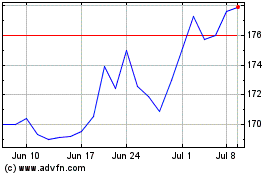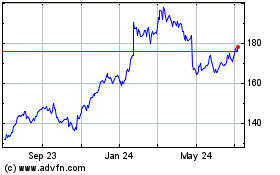Many companies are tangling in court over mobile phone
technology these days, but the showdown between Oracle Corp. (ORCL)
and Google Inc. (GOOG) has unusual dimensions--particularly the
vastly different estimates of the money at stake.
The case, headed for trial in a San Francisco courtroom next
week, has been marked by more than a year of posturing and
short-lived settlement talks between Oracle CEO Larry Ellison and
Larry Page, Google's chief. Now the sides are far apart on the
potential liability if Google is found guilty.
Oracle, if victorious in court, is expected to press for an
award of about $1 billion. Google, meanwhile, says potential total
damages could be less than $100 million.
Another important element is the possibility that Oracle could
convince a federal judge to issue an injunction against Android,
the Google software that has become the most widely used platform
for smartphones.
The case centers on Oracle's allegations that Android mobile
phone software infringes patents and copyrights associated with the
programming technology known as Java. Oracle obtained Java and
related intellectual property through its 2010 purchase of Sun
Microsystems, which developed Java in the 1990s. The technology,
which includes a programming language, is a widely used foundation
for many software products.
Among the issues in the case is whether Google copied Java
features in Android without paying Sun to license them.
In a statement released by Oracle on Thursday, David Boies, its
lead attorney in the case, said "Google's management, at its very
highest level, made the decision" to use Java in Android and not
secure a license for the software. Boies said that, "Google is
damaging the entire Java ecosystem" by not complying with licensing
terms.
Oracle, the Redwood Shores, Calif., business software giant,
wants an injunction to force Google to acquire a Java license and
either make Android fully compatible with the technology, or force
Google to contribute its Java innovations to outside developers,
Boies said.
A Google spokesman declined to comment.
An internal email to Andy Rubin--Google's head of Android--from
a Google employee that surfaced last year as part of the litigation
has already attracted attention.
The employee wrote that Google co-founders Page and Sergey Brin
had asked about alternatives to Java to help build Android.
However, the employee wrote that, "We conclude that we need to
negotiate a license for Java," according to court filings.
Google attorneys have argued that the internal proposal that
Google pay for a Java license arose only as a possible solution
after Oracle had threatened litigation, according to filings.
The email may surface again as part of trial proceedings.
Opening arguments are expected to begin as soon as Tuesday, and the
trial may take up to about two months to complete. Some
high-profile witnesses who make take the stand include Oracle's
Ellison and Google's Rubin.
Another point of potential interest in the case: Evidence
presented may include the amount of revenue Google reaps from
Android. That figure has been something of a mystery. While Android
is an open-source project provided for free to device makers, it
does help generate sales of mobile advertising and software
apps.
Only two of the seven Sun patents originally asserted by Oracle
in the case remain, however, as the other five were knocked out
during pre-trial action.
One of the two remaining patents was issued to Sun in 2000, and
covers a way of condensing computer code. The other was won by Sun
in 2003, when it was re-issued a patent originally filed in Dec.
1992. Due to the 20-year lifespan of U.S. patents from the date of
filing, that patent is due to expire at the end of this year. It
covers a method of generating computer code.
David Pratt, the president of patent analysis firm M-Cam Inc.,
said the patent's impending expiration is irrelevant to the trial,
because the only time period that matters is that between when
Google was notified it might be infringing and the present.
More importantly, Pratt says, several technology giants
including Microsoft Corp. (MSFT) and International Business
Machines Corp. (IBM) are likely taking a keen interest in the trial
due to start next week. That's because those firms have patents
similar to those being asserted by Oracle, and therefore are likely
interested in how much value Oracle can wring from them in
court.
"It's a benchmarking process," Pratt said.
On the copyright side of the case, Oracle alleges that
interfaces, or so-called APIs in Google's Android code infringe on
intellectual property that protects Java.
Since Oracle filed the suit in August 2010, the two Silicon
Valley giants have been jostling through their legal teams over
Oracle's various complaints and damages assessments.
Oracle experts initially estimated damages could reach $6
billion while Google argued the calculations were based on faulty
methodology. Elimination of some patent claims from the suit also
contributed to Oracle's expected claim of about $1 billion.
Last year, a judge in the case ordered Oracle's Ellison and
Google's Page to meet face to face to try and reach a settlement.
Those talks, in addition to a last-minute settlement negotiations
ordered last month, came to naught.
-By John Letzing, Dow Jones Newswires; 415-765-8230;
john.letzing@dowjones.com
International Business M... (NYSE:IBM)
Historical Stock Chart
From Mar 2024 to Apr 2024

International Business M... (NYSE:IBM)
Historical Stock Chart
From Apr 2023 to Apr 2024
